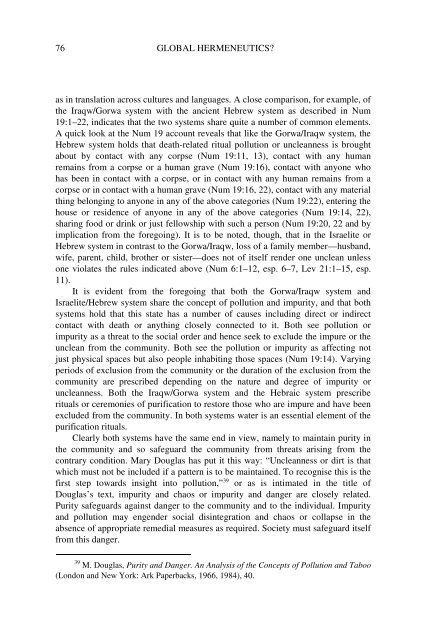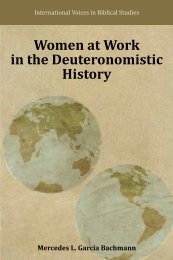Global Hermeneutics? - International Voices in Biblical Studies ...
Global Hermeneutics? - International Voices in Biblical Studies ...
Global Hermeneutics? - International Voices in Biblical Studies ...
Create successful ePaper yourself
Turn your PDF publications into a flip-book with our unique Google optimized e-Paper software.
76 GLOBAL HERMENEUTICS?<br />
as <strong>in</strong> translation across cultures and languages. A close comparison, for example, of<br />
the Iraqw/Gorwa system with the ancient Hebrew system as described <strong>in</strong> Num<br />
19:1–22, <strong>in</strong>dicates that the two systems share quite a number of common elements.<br />
A quick look at the Num 19 account reveals that like the Gorwa/Iraqw system, the<br />
Hebrew system holds that death-related ritual pollution or uncleanness is brought<br />
about by contact with any corpse (Num 19:11, 13), contact with any human<br />
rema<strong>in</strong>s from a corpse or a human grave (Num 19:16), contact with anyone who<br />
has been <strong>in</strong> contact with a corpse, or <strong>in</strong> contact with any human rema<strong>in</strong>s from a<br />
corpse or <strong>in</strong> contact with a human grave (Num 19:16, 22), contact with any material<br />
th<strong>in</strong>g belong<strong>in</strong>g to anyone <strong>in</strong> any of the above categories (Num 19:22), enter<strong>in</strong>g the<br />
house or residence of anyone <strong>in</strong> any of the above categories (Num 19:14, 22),<br />
shar<strong>in</strong>g food or dr<strong>in</strong>k or just fellowship with such a person (Num 19:20, 22 and by<br />
implication from the forego<strong>in</strong>g). It is to be noted, though, that <strong>in</strong> the Israelite or<br />
Hebrew system <strong>in</strong> contrast to the Gorwa/Iraqw, loss of a family member—husband,<br />
wife, parent, child, brother or sister—does not of itself render one unclean unless<br />
one violates the rules <strong>in</strong>dicated above (Num 6:1–12, esp. 6–7, Lev 21:1–15, esp.<br />
11).<br />
It is evident from the forego<strong>in</strong>g that both the Gorwa/Iraqw system and<br />
Israelite/Hebrew system share the concept of pollution and impurity, and that both<br />
systems hold that this state has a number of causes <strong>in</strong>clud<strong>in</strong>g direct or <strong>in</strong>direct<br />
contact with death or anyth<strong>in</strong>g closely connected to it. Both see pollution or<br />
impurity as a threat to the social order and hence seek to exclude the impure or the<br />
unclean from the community. Both see the pollution or impurity as affect<strong>in</strong>g not<br />
just physical spaces but also people <strong>in</strong>habit<strong>in</strong>g those spaces (Num 19:14). Vary<strong>in</strong>g<br />
periods of exclusion from the community or the duration of the exclusion from the<br />
community are prescribed depend<strong>in</strong>g on the nature and degree of impurity or<br />
uncleanness. Both the Iraqw/Gorwa system and the Hebraic system prescribe<br />
rituals or ceremonies of purification to restore those who are impure and have been<br />
excluded from the community. In both systems water is an essential element of the<br />
purification rituals.<br />
Clearly both systems have the same end <strong>in</strong> view, namely to ma<strong>in</strong>ta<strong>in</strong> purity <strong>in</strong><br />
the community and so safeguard the community from threats aris<strong>in</strong>g from the<br />
contrary condition. Mary Douglas has put it this way: “Uncleanness or dirt is that<br />
which must not be <strong>in</strong>cluded if a pattern is to be ma<strong>in</strong>ta<strong>in</strong>ed. To recognise this is the<br />
first step towards <strong>in</strong>sight <strong>in</strong>to pollution,” 39 or as is <strong>in</strong>timated <strong>in</strong> the title of<br />
Douglas’s text, impurity and chaos or impurity and danger are closely related.<br />
Purity safeguards aga<strong>in</strong>st danger to the community and to the <strong>in</strong>dividual. Impurity<br />
and pollution may engender social dis<strong>in</strong>tegration and chaos or collapse <strong>in</strong> the<br />
absence of appropriate remedial measures as required. Society must safeguard itself<br />
from this danger.<br />
39 M. Douglas, Purity and Danger. An Analysis of the Concepts of Pollution and Taboo<br />
(London and New York: Ark Paperbacks, 1966, 1984), 40.




